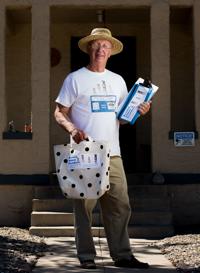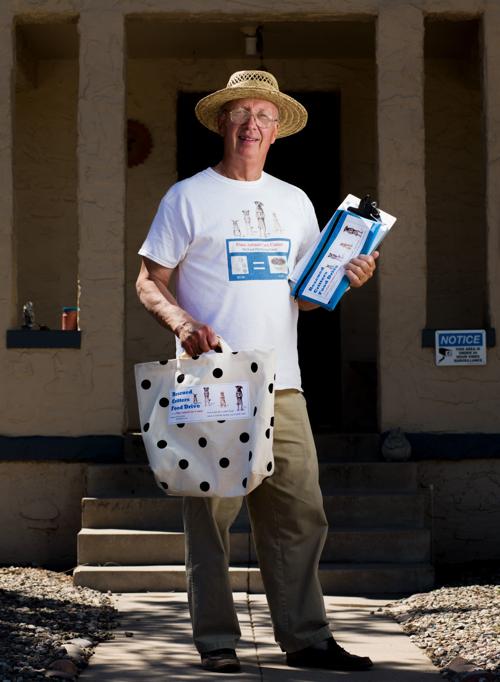With the help of his neighbors, 77-year-old Peter Norback has donated to the Pima Animal Care Center every week since September.
Every Sunday morning, Norback visits 52 of his neighbors in the Miles neighborhood, near East Broadway and South Kino Parkway. He collects cash, checks, pet food and supplies.
And each Monday, he drives his truck — which sports a “Rescue Critters Food Drive” decal — to PACC to hand deliver the donations. He’s there so often that the staff immediately recognizes him.
Since September, Norback and his neighbors have donated what is equivalent to more than 4,000 pounds of food.
When Norback started the initiative, he hoped to collect 4,333 pounds of donations within the year. And by the looks of it, he’s almost there.
But Norback’s consistent giving didn’t start with PACC.
In 2008, Norback started a “One Can A Week” program, where he encouraged his neighbors to donate one can of food each week. He personally delivered the donations to the Community Food Bank of Southern Arizona.
He and his neighbors compiled donations for the food bank weekly for more than seven years. In those seven years, his neighborhood donated $18,000 and 70,000 pounds of food.
When he ventured outside of his neighborhood and collected donations from local shops and markets, he was able to pull together another 80,000 pounds in that seven-year time frame.
But in 2015, Norback had surgery on his appendix, causing him to take a break from his door-to-door donations. He also took that time to rethink his program’s initiative.
By 2018, he was back on his feet and ready to start his charitable giving once again. But he decided to switch his focus.
“I recuperated from (the surgery) and was thinking about what I wanted to do,” he says. He ultimately decided to shift gears and help PACC.
Since his first encounter with PACC staff, Norback says he’s been impressed by their work.
“Every (neighbor) I talk to, several of them, have stories about PACC,” Norback says. “It’s been nothing but positive.”
Norback says he’s in awe of PACC’s staff and programs — namely their low-cost spay and neuter options, in addition to their community cat program that helps feral cats. And he loves the atmosphere of the shelter’s newly-renovated building.
Nikki Reck, PACC spokeswoman, said a consistent donor like Norback is “everything” for an organization like PACC. “Any little thing helps,” she says.
“We’re lucky to have someone like Peter to collect from people who don’t necessarily want to leave the house, but want to help,” Reck says.
“It’s good to know that we have the support of his community,” added Bennett Simonson, PACC community programs manager. “I think it speaks to how people feel about PACC — that Peter is able to do this every week.”
Norback says he’s always been one to help others — whether that’s through writing books or helping people with traumatic brain injuries find jobs. In his neighborhood, he’s also cleaned walkways and planted flowers.
He’s also trekked the neighborhood to jot down locations of potholes to send to the transportation department and has facilitated neighborhood cleanups with the help of roll-off containers from the city.
IT TAKES A VILLAGE
Norback hopes that other neighborhoods can start their own weekly programs — to benefit PACC or other nonprofit organizations. Plus, he says it’s nice to get to know your neighbors.
Neighborhoods need someone who really cares, he says.
Norback also hopes to implement other programs to get children and schools involved in teaching others and engaging in community service. He hopes that one day, community service involvement will be seen as vital as a high school diploma.
“I want to leave a better world,” he says.
And Norback and his neighbors aren’t the only ones lending a helping hand in the community. There are lots of consistent donors for various organizations across Southern Arizona.
Within months of learning about SARSEF — the Southern Arizona Research, Science and Engineering Foundation — Zach Saber and his wife DeeAnn, began donating. For the last five years, they’ve donated every month to the organization that serves students in grades K-12. Zach Saber estimates they’ve donated more than $5,000.
“We’ve always been great supporters of our local community,” he says, adding they chose to donate to SARSEF because of the educational opportunities it provides to children.
“There are a lot of kids to support and a lot of kids to educate,” he says, adding that the couple has also donated to a horse shelter for three years and a pet rescue for 10.
The Sabers are also judges during SARSEF’s annual science fair and they give two out-of-pocket cash prizes to two children.
Each year, the Sabers sit down and build charitable donations into their budget. Zach Saber says consistent donating is important because it gives organizations a better idea of what they can afford to do and who they can assist for the year.
He says even the smallest of donations can make an impact.
“It’s so vital,” he says. “And it doesn’t matter the organization. If it’s in your heart, make that commitment.
“When you give, you receive so much more.”
And donating money isn’t the only valuable thing to nonprofit organizations — volunteering your time is also important.
John Clevenstine has volunteered at the Gospel Rescue Mission since 2010. He even volunteered daily for about three weeks between March and April of this year.
He’s worked in a number of areas in the Gospel Rescue Mission — in the pantry, on phones and even in construction. He says he works wherever he’s needed.
Clevenstine also donates money on a quarterly basis.
“My son was homeless for four years in the Phoenix area,” he says. “That’s what drew me to this ministry.”
Clevenstine credits the Gospel Rescue Mission, in addition to God, for helping his son find a home.
“Gospel Rescue Mission helped get my son off the streets and brought him to the men’s center,” he says. “Now he has his own apartment.
“That’s why I continue to volunteer.”





